With Both Hands Classics: Harry Potter

I have recently been listening to the Harry Potter audiobooks with my youngest son. He loved them so much that we listened to all seven books all the way through five or six times before I managed to finally get him to listen to something else [Percy Jackson to the rescue]. So I have had lots of time to ponder the merits of the books that made J. K. Rowling famous and rich.
To be a With Both Hands Classic, a book needs to be something that I can profitably return to again and again. The Harry Potter books hold up well when listened to repeatedly, and I think this ought to be seen as evidence that the success of Harry Potter was not a fluke, but rather a reflection of how well Rowling crafted her story. The response of her audience indicates that Rowling tapped into popular and enduring elements of storytelling, and it is the task of the critic to identify those elements and place them in their broader context.
With that in mind, let's take a deep dive into what Rowling does well, what she is less skilled at, and see how that all rolls up into one of the most popular stories of the late 20th and early 21st centuries.
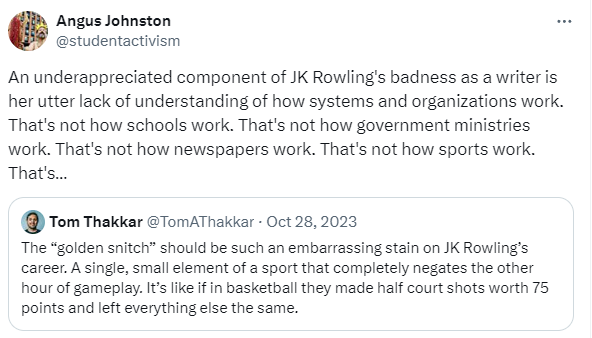
I have read some pretty hilarious criticisms of Rowling's writing that made me finally decide to write this post, because I want to give a better account than these. It is hard to avoid the impression that most contemporary criticisms are not primarily motivated by any fiction Rowling wrote per se, but rather are a reflection of disappointment in Rowling's public statements against currently fashionable transgender causes after she had been elected the standard bearer for progressive causes a decade earlier.
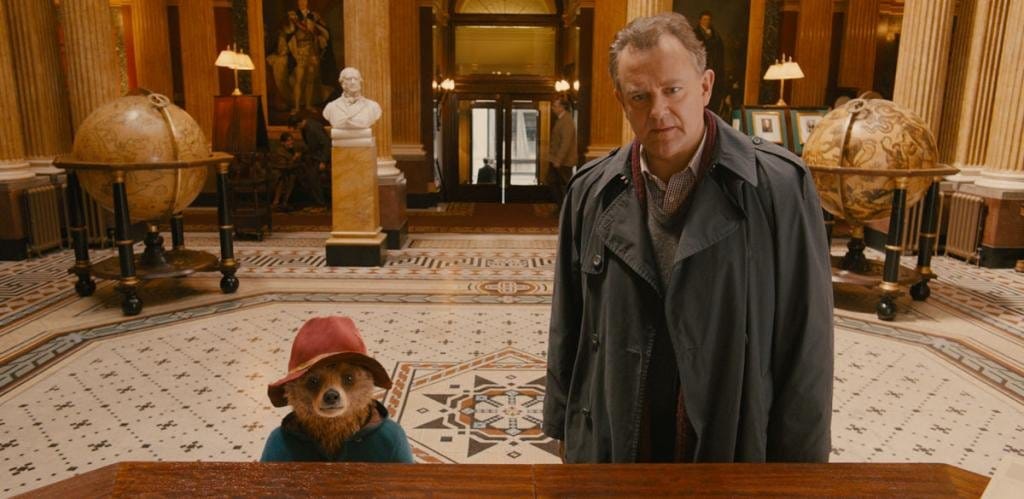
Part of my critical assessment of Rowling's work is that her very unofficial election was always based on a mistaken assessment of Harry Potter as a work of art, which in the manner of a number of very popular works in the last two or three decades, combines unremarkable liberal text with remarkably reactionary aesthetics and subtext. However, the primary audience for Harry Potter in the 2010s did not notice this because contemporary readers are archetypally impoverished, and tend to not have any literary or historical frame of reference that extends back past 1980, and often not even that far. Thus the over-reaction when the implications finally became clear.
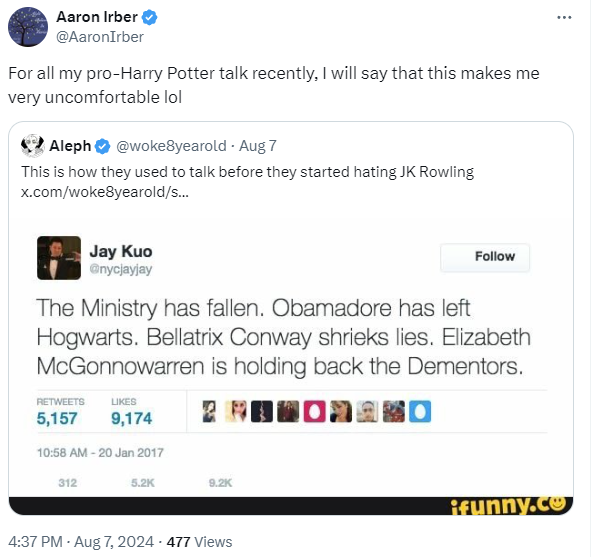
In this post, I will focus in on the books because much like with Jackson's movie adaptions of the Lord of the Rings, the Harry Potter movies, while excellent, have a tendency to displace people's ideas of what is actually in the books. I like the Harry Potter movies, especially the early ones with their emphasis on practical effects, because they embody a sense of wonder, but what I wish to do here is dig deep into Rowling's text.
The place to begin is these books are a lot of fun. They are fun to read, and they are great to listen to as well. The versions I have were narrated by Jim Dale, who did an excellent job with Rowling's story. Narrators can make or break the listening experience, and for my son and I, Dale's performance made it.
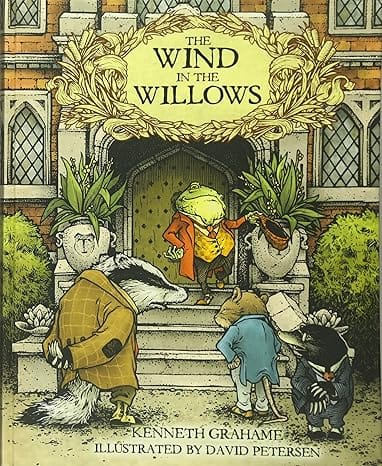
One of Rowling's great strengths as an author is in her sense of whimsy. English fantasy in particular has a wonderful tradition of storytelling elements that are patently ridiculous, but a lot of fun. Roald Dahl is probably the most familiar author from this tradition, but I would certainly include Kenneth Grahame and Diana Wynne Jones as well.
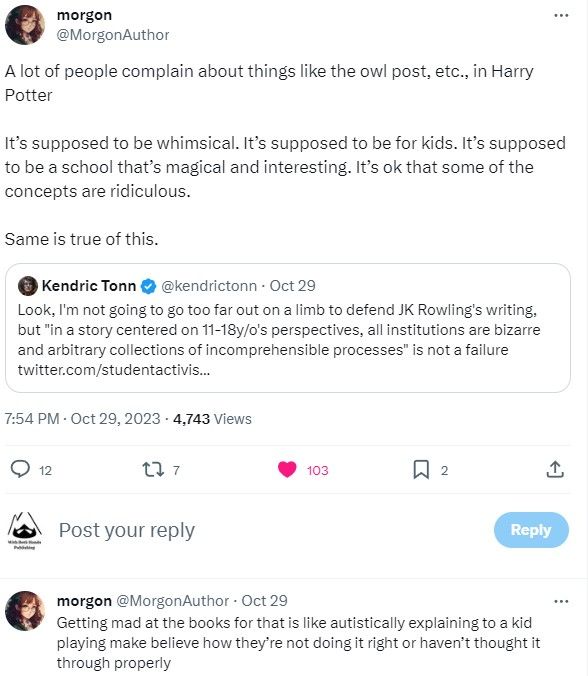
To insist, as Johnston's post does, that Rowling is a bad writer because the wizarding world doesn't imitate the institutional dynamics of the real world is to make a category error. Low-mimetic prejudices about realistic description aren't the only possible way to tell a story, especially in a story that takes the form of a romance. Romances tap more directly into mythic modes of storytelling, and the more a story leans into myth, the less important descriptive realism will be.
But I think that we will need to establish exactly what I mean by that, as current marketing genres mostly boil down to setting or milieu instead of literary form. Let's ground ourselves in Rowling's selected form, using Northrop Frye's "First Essay" in the Anatomy of Criticism to provide our definitions. This will be useful, because once we can clearly see what kind of story Harry Potter is, then we will be able to understand why lots of poor criticism of Harry Potter amounts to using the wrong tool for the job, or expecting a traditional form to be something its not.
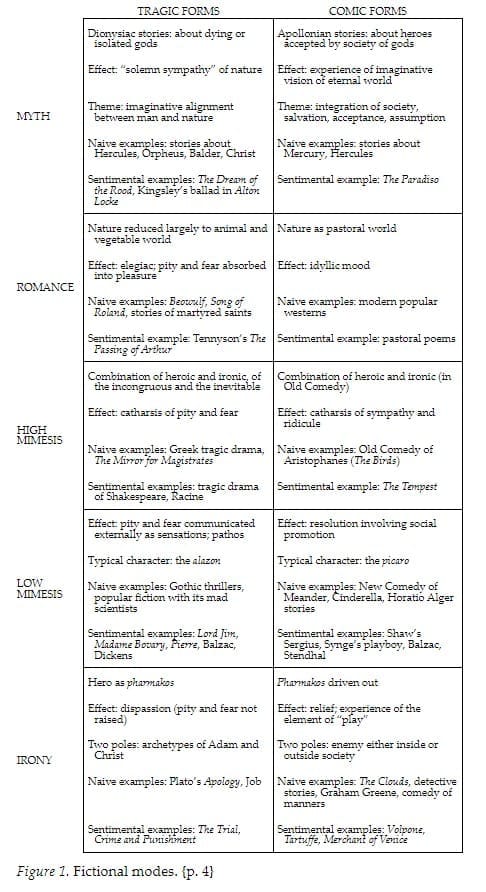
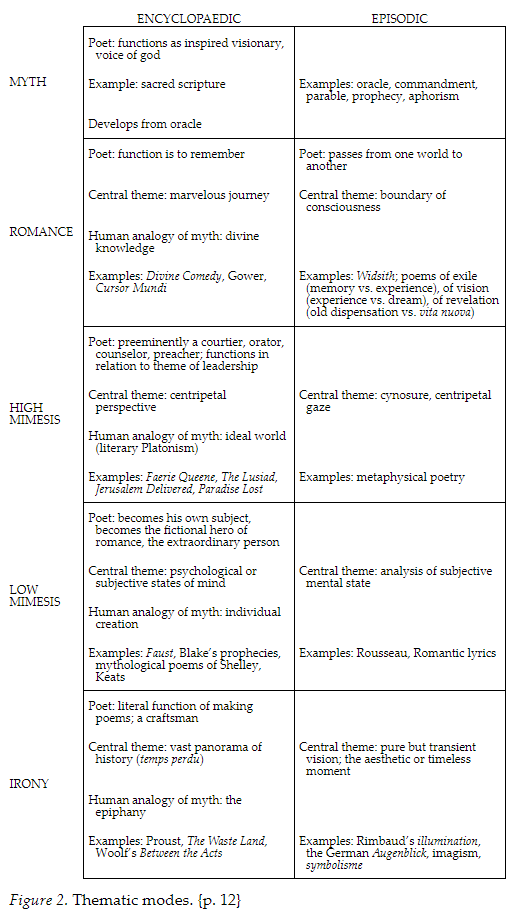
Frye's Modes of Heroic Action and Themes, figure from Denham
In the "First Essay", Frye used a cycle of literary forms to identify characteristic features of stories. There is a cycle of modes of heroic action, how the main character interacts with the literary world, and there is a parallel cycle of thematic modes, which is how the author interacts with her audience. The cycles move sequentially from more mythic to more realistic over time because Frye based them on how stories historically developed, but multiple literary forms are always simultaneously in use in each period even if one form tends to be dominant.
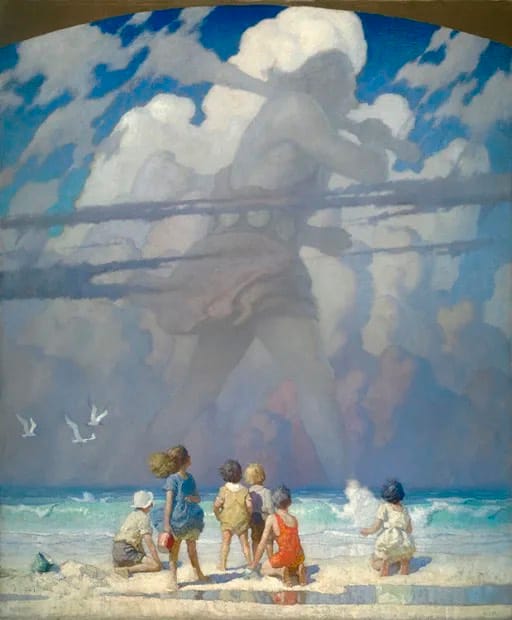
The form or style of a romance is best seen as a sequence of marvelous adventures. This is a key element of the Harry Potter stories, in which we get to see [and vicariously experience] Harry's wonderment at the strange world of witches and wizards that is his birthright. The overall narrative is also of a traditional form for a romance. Harry's destiny is to grow up and defeat the evil wizard who murdered his parents, not only avenging their death, but also setting the whole world to rights.
Yet, at the same time, Rowling's style is heavily influenced by more recent books as well. We spend a lot of time in Harry's head, seeing all of his emotions as he both learns about the magical world and as he grows up. This focus on Harry's everyday life and on his subjective mental state is characteristic of nineteenth century novels, the form that Frye helpfully named the low-mimetic. As unusual as that name is, the reason Frye didn't just call it "realistic" or "realism" is that realism is hard to define absolutely. The ironic style is in its own way more "realistic" than the low-mimetic, so Frye needed a signpost on the continuum of realism to point to a distinctive style of writing.
Thus the mode of action and theme are a blend of romance and low-mimesis. This kind of blend is extremely common in 20th century fantasy, although recent works tend more toward a blend of romance and irony. I say it is a blend because Rowling chose to combine the traditional chosen one hero of a romance with the everyman hero of the low-mimetic, and different parts of the books feature one or the other aspect more prominently.
You can see how this plays out because Harry is not only fated to be Voldemort's nemesis, but he also grows up in a completely unremarkable environment of suburban England. For all he knows, he is a perfectly ordinary boy living a perfectly ordinary life. Until he isn't. That structure isn't uncommon in unblended romance, but what really makes it low-mimetic is how even after Harry goes to Hogwarts, he retains all of the typical experiences of a boy his age. A hero completely in the mythopoeic mode would be too busy having adventures to go to class or have awkward teenage romances.
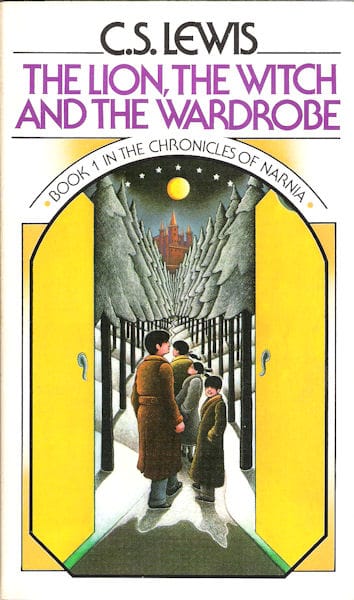
I've lost the original source, but one of the cruelest yet most accurate things said about C. S. Lewis was that he wrote about children as if he'd never actually met one. Rowling, on the other hand, has an intuitive sense for what children are really like, and the Harry Potter books capture this well.
It is Harry's experiences, and the verisimilitude with which Rowling describes them, that makes Harry Potter a relatable character. In low-mimetic fiction, the audience responds to the common humanity of the hero. In romance, the audience responds to the hero's destiny which allows him to overcome all obstacles. Harry Potter personifies both.
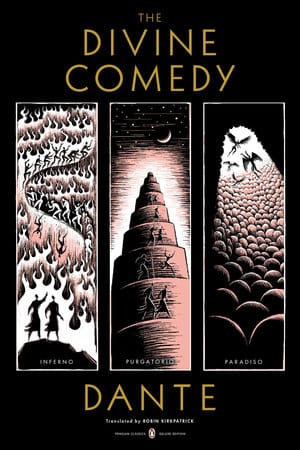
In addition, the story has the form of a comedy. This is again a term of art. While the Harry Potter stories have many funny moments, that is not what Frye means. There is a distinction in stories between the hero being integrated into his society [comedy] and the hero being expelled from his society [tragedy]. As Harry moves from a place of exclusion to place of inclusion, you know that the overall structure is that of a comedy.
It is also characteristic of the form of comedy for the hero to be initially be at odds with his fictional society over some matter of law. This is the deeper structural reason for Harry's notorious rule-breaking at Hogwarts:
We notice how often the action of a Shakespearean comedy begins with some absurd, cruel, or irrational law: the law of killing Syracusans in the Comedy of Errors, the law of compulsory marriage in A Midsummer Night's Dream, the law that confirms Shylock's bond, the attempts of Angelo to legislate people into righteousness, and the like, which the action of the comedy then evades or breaks.
--Northrop Frye, "Third Essay"
Part of the resolution of a comedy is that the hero is ultimately seen to be justified in breaking an unjust law, at which point he can be fully accepted into his now reformed society. Harry initially only rebels against the pedestrian rules of his school, but this is the perfect training ground for more serious resistance later, when his fictional society is entirely dominated by the will of his enemy.
In a low-mimetic comedy, the usual ending involves an increase in the hero's social status after his victory. It is also traditional for there to be a wedding. This element dovetails nicely with the traditional ending of a comedic romance, where the hero wins the love of his life, and the bad guy gets dead. The blend works very well in this case.
The overall narrative structure of the seven Harry Potter books also has an additional pacing element of one Hogwarts school year per book. This is another tell that we in mythic territory, because the structure of the academic year dominates the narrative in a way that isn't compatible with low-mimetic plotting. The conventions of the low-mimetic would require that events should unfold in a sequence of cause and effect, rather than in a cycle dominated by something external.
On the other hand, a more contemporary style is visible in Rowling's characterization. The subjective intensity of the low-mimetic primarily is seen through Harry himself, with other characters exhibiting various degrees of more, or sometimes very much less, natural character development as needed to support his story arc within the broader mythic narrative.
An example of how Rowling does this is all of Harry's substitute father figures, Hagrid, Lupin, Sirius, Arthur, and Dumbledore, are flawed men. Each of them means well and tries to do well by their own lights, but each also has characteristic weaknesses: drink, uncertainty, rashness, lack of ambition, excess of ambition. But while these men are drawn in relatively realistic ways, structurally they are all there to serve Harry's destiny, rather than to develop following their own logical path.
But what really stood out to me when I listened to the Harry Potter books with my son is how Rowling is a supremely gifted and vindictive caricaturist. Other than Harry himself, her most memorable characters are not realistic at all. Rather they are hyper-realistic, more relatable the more over the top they are. The books are positively stuffed with characters whose vices dominate their personalities in the most grotesque fashions, yet at the same time seem exactly like someone you know. Dolores Umbridge takes pride of place, but honorable mention should go to Ludo Bagman, the aging sportsman who gets by on his fading charm and not much else, and Ron's ancient and catty Aunt Muriel who delights in gossip and invective.
But perhaps even better than Dolores Umbridge are the collective character, the villagers of Little Hangleton. I'll quote the passage from the beginning of book 4 so you can see Rowling's words for yourself:
The Hanged Man, the village pub, did a roaring trade that night; the whole village had turned out to discuss the murders. They were rewarded leaving their firesides when the Riddle's cook arrived dramatically in their midst, and announced to the suddenly silent pub that a man called Frank Bryce had just been arrested.
'Frank!' cried several people. 'Never!'
Frank Bryce was the Riddles' gardener. He lived alone in a run-down cottage in the Riddle House grounds. Frank had come back from the war with a very stiff leg and a great dislike of crowds and loud noises, and had been working for the Riddles ever since.
There was a rush to buy the cook drinks, and hear more details.
'Always thought he was odd,' she told the eagerly listening villagers, after her fourth sherry. 'Unfriendly, like. I'm sure if I've offered him a cuppa once, I've offered it a hundred times. Never wanted to mix, he didn't.'
'Ah, now,' said a woman at the bar, 'he had a hard war, Frank, he likes the quiet life. That's no reason to —'
'Who else had a key to the back door then?' barked the cook. 'There's been a spare key hanging in the gardener's cottage far back as I can remember! Nobody forced the door last night! No broken windows! All Frank had to do was creep up to the big house while we was all sleeping...'
The villagers exchanged dark looks.
'I always thought he had a nasty look about, right enough,' grunted a man at the bar.
'War turned him funny, if you ask me,' said the landlord.
'Told you I wouldn't like to get on the wrong side of Frank, didn't I Dot?' said an excited woman in the corner.
'Horrible temper,' said Dot, nodding fervently. 'I remember, when he was a kid...'
By the following morning, hardly anyone in Little Hangleton doubted that Frank Bryce had killed the Riddles.
That is an absolutely devasting portrait of the kind of nasty insular people who are always minding each other's business, and who in the book made Frank's life miserable for forty years until he was murdered himself. It was this passage in particular that makes me doubt that Rowling could truly be considered a bad writer. She is simply uninterested in institutional dynamics, while being very interested in interpersonal dynamics.
In the hands of another author, it might have been conceivable for a story outwardly like Harry Potter to be a "hard" fantasy, one in which we see what a society of wizards might be like if we assumed that magic was real but left all else unchanged, which seems to be the frame of many of the complaints about Rowling's writing. But that just isn't what Rowling wanted to write about, and in any case her style is solidly within the British fantasy tradition.
Part of this is that the Harry Potter books, while they feature a boy hero, are written in a feminine way. Harry Potter written like alternative history, following the logical implications of magic being real, would come across as far more masculine. To give you an example that occurred to me while driving, I wondered how many students there are at Hogwarts. On the evidence of the text, it is...unclear. In the first couple of books, I think you could be excused if it seemed like each class was relatively small, given the number of named characters you meet and the class descriptions. But then, in book 3, there is this description of the Slytherin section of the stands at the Quidditch final:
Behind the Slytherin goalposts, however, two hundred people were wearing green;
Given how disliked Slytherin was, especially in Quidditch, it seems unlikely that anyone else from the school was standing for them. That line gave me an entirely different expectation for how big classes at Hogwarts were. Roughly three times bigger than what I had guessed from the text of the first two books.
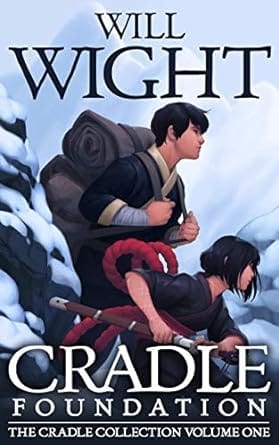
But that is me, a man, and engineer, and an enjoyer of the kind of fantasy that has a fully realized anthropology. I think the reason why these details are so vague in the text is that Rowling just doesn't find that interesting in the same way I do. Maybe she knew how big the classes were to start, or maybe she just made things up as she went along. It is honestly hard to tell this from the text, which contains few details on things like class size. This is very different from the way in which the villagers of Little Hangleton turned on Frank, a man they had known their whole lives, in an instant. People in little towns can be just like that, and Rowling captured that tendency in a memorable way.
Thus, I see Rowling's caricatures as superb, narrative structure as a relative strength, and your opinion of her characterization will depend on whether you really want characters to develop in a natural manner, or accept that in the older form characters have structural purposes. Relative weaknesses are a lack of interest in systematic speculation [although I really see this as a feature not a bug given the way fantasy stories have been distorted by it] and an unexceptional prose style. I cannot understand why people insist that Rowling's prose is bad. I completely understand if you want to say it isn't remarkable. When I read Brideshead Revisited during Lent, I bookmarked a dozen truly stunning passages by Evelyn Waugh. When I read the Harry Potter books...not so much.
Since these books really are intended to be read and enjoyed by children, that is fine. Waugh's talent would have been wasted here, as his elegant phrases would not impress Rowling's target audience. However, it nonetheless seems that her audience did misconstrue the symbolism and themes of the Harry Potter books. But in order to illustrate this, you will have to forgive the inclusion of a "wall-of-text" style meme.
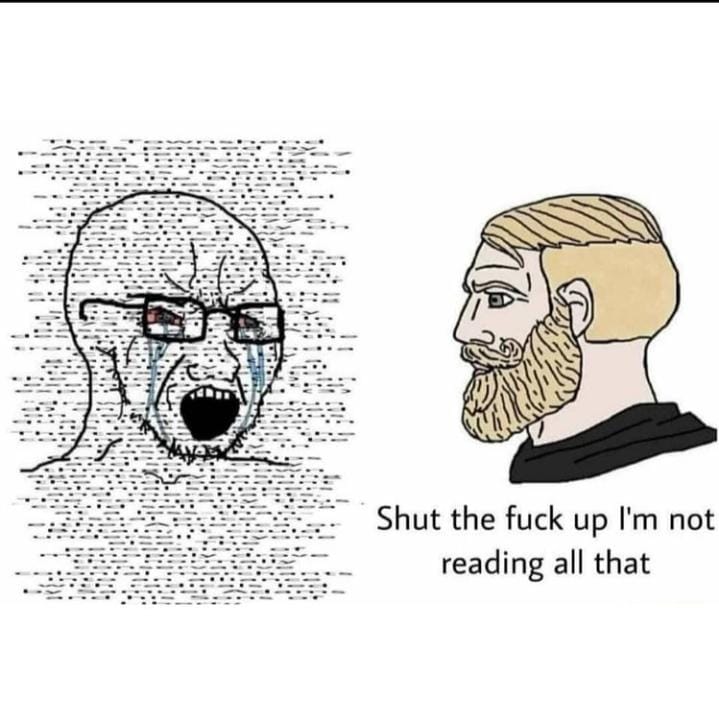
If you want to see what I mean, take a look at this:
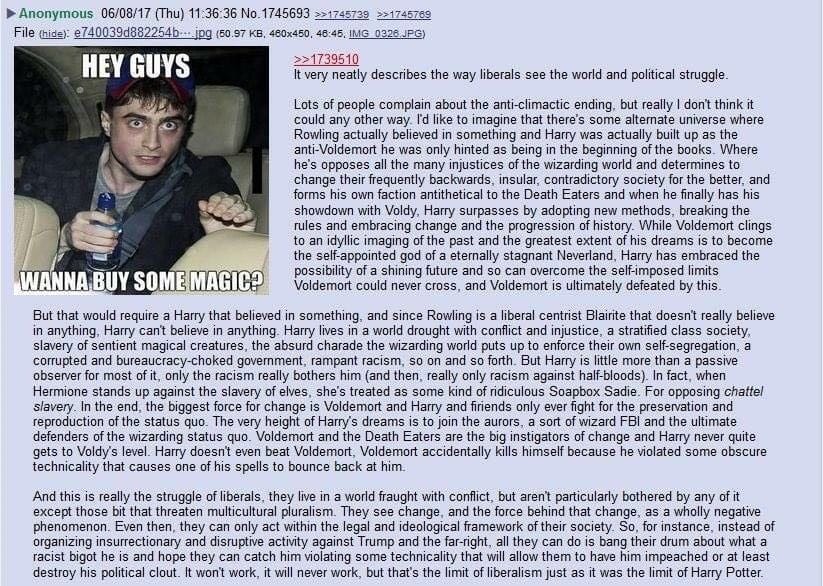
This is what I mean when I say that Rowling's fans are archetypally impoverished. This reading of Rowling's themes cannot be supported by the text, and is incidentally also a good example of why I am not an advocate of the Death of the Author theory. While it is not the case that the author's intentions uniquely define the meaning that can be derived from a work, it is also quite possible for readers to have an interpretation that is utterly at odds with the text as written, and thus should be disregarded as illiterate.
In order to delve into this in detail, we'll need to use the concepts from Frye's "Second Essay", which provides methods of symbolic interpretation that can be mapped on to different levels of meaning, and the "Third Essay", which focuses in its entirety on archetypal and mythical interpretation.
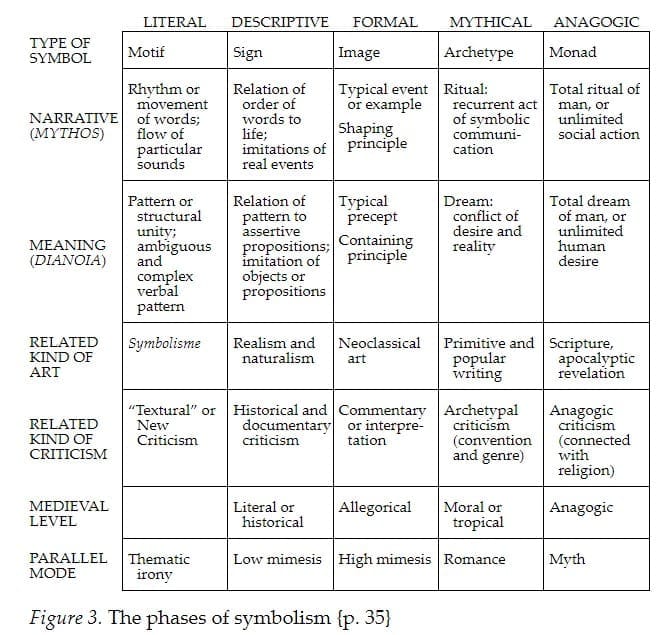
There is a natural mode for each method of symbolic interpretation, but all the methods can be fruitfully employed on any work with sufficient depth. In this case, the mythical mode of interpreting archetypes is needed most, because Harry Potter is a romance structurally and thematically.
The error the wall-of-text makes is looking for a revolution at the climax, instead of a restoration. Harry Potter is in a long line of heroes who kill an evil usurper king. Once the usurper is defeated, then the world can be restored or renewed. This basic idea is foundational to the romance in general, such that we can generalize about the qualities that Harry must exhibit:
The enemy is associated with winter, darkness, confusion, sterility, moribund life, and old age, and the hero with spring, dawn, order, fertility, vigor, and youth.
--Northrop Frye, "Third Essay"
This is also related to myths that link the health of the king to the health of the land. Voldemort's influence brings out the worst in everyone, and once he is gone, society can be restored. This fits very well with the traditional form of a comedy as well, because the rectification of the hero's social status often comes from repealing or revoking the unjust laws that initially made him an outcast.
There is however at least one perceptive thing about the wall-of-text, and that centers on Rowling's liberalism.
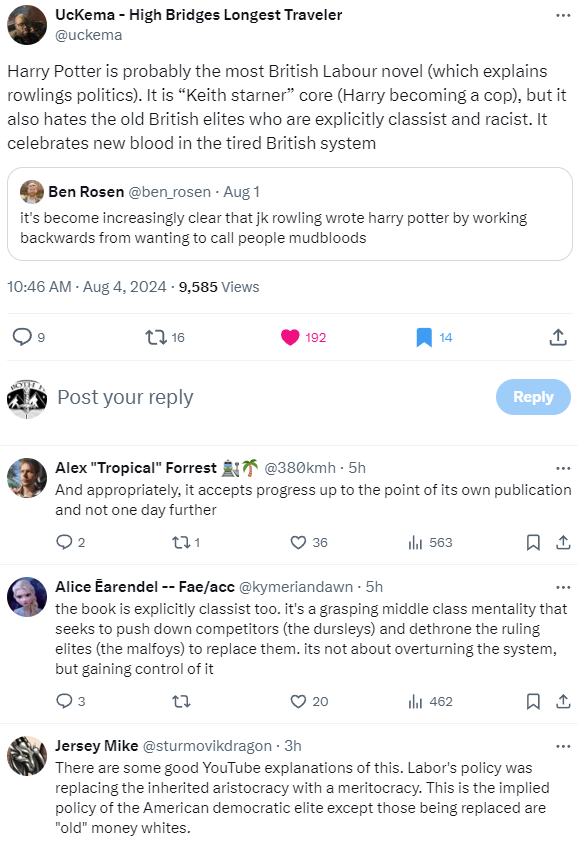
When we use the descriptive and allegorical modes of symbolic analysis, it is easy to see that the world in which Harry Potter lives is broadly like our own, and that world is seen from the point-of-view of ordinary political liberalism circa 1990. In the British context the best term would be "Labour" rather than liberal, as in the UcKema post.
In Hogwarts, everything is very British, but the student body includes Britons of every ancestry. The Quidditch teams are co-ed, even at the highest levels of competition. There is class conflict between old-blood old-money wizards and arriviste Muggle-borns. It isn't crazy to see all of this as just the world as Rowling saw it, imported as background. It doesn't matter whether this was conscious or unconscious, it is just part of the frame of the book.
Another case where I've lost the original source, I saw a post mentioning even the names of characters in the Harry Potter books reflect British social classes as seen through a Labour voter's eyes, with Potter being a middle-class occupational surname, while Malfoy is a Norman-style name originally from French. In Jim Dale's audio performance, the three Black sisters, Narcissa, Bellatrix, and Andromeda, were voiced with French accents, which fits the Potter/Malfoy class distinction very well. Dale also pronounced Voldemort in a pseudo-French way for the first four books, with a silent final "T".
But Harry Potter is not an explicit allegory for 1990s Britain. If it were, it would not resonate with so many readers. These surface level elements do not define the themes of the books, which are more universal. So while I think there is a persistent tendency to misinterpret Harry Potter by applying low-mimetic expectations to a mythical story, there is a kernel of truth in the complaints that I've copied here. It isn't merely that the liberalism of thirty years ago looks reactionary to current day progressives; there really are reactionary themes in Harry Potter.
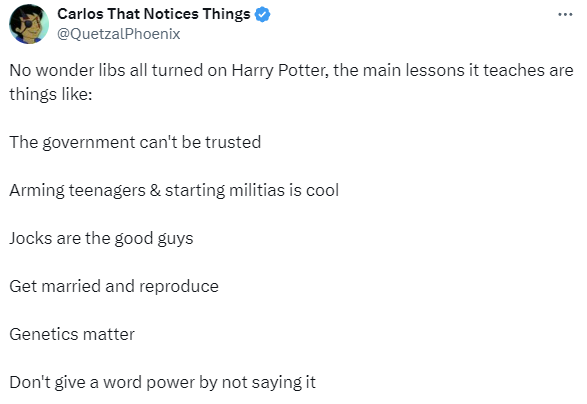
Because Harry Potter participates in the archetype of the restoration of the kingdom after the defeat of a usurper, thematically the story is far more reactionary than Rowling herself actually is. Which makes it fascinating that Harry Potter became so closely associated with progressive politics a decade ago.
It isn't unusual for a romance to be used in this way. Frye thought it was something you frequently found in history:
The romance is nearest of all literary forms to the wish-fulfilment dream, and for that reason it has socially a curiously paradoxical role. In every age the ruling social or intellectual class tends to project its ideals in some form of romance, where the virtuous heroes and beautiful heroines represent the ideals and the villains the threats to their ascendancy. This is the general character of chivalric romance in the Middle Ages, aristocratic romance in the Renaissance, bourgeois romance since the eighteenth century, and revolutionary romance in contemporary Russia.
--Northrop Frye, Third Essay
I think part of the explanation for this phenomenon is provided by Spotted Toad's essay "Getting Your Owl", in which Toad identified Hogwarts itself as an metaphor for the kind of institutional authority that powers left of center politics in both the United Kingdom and the United States. To gain access to the levers of power, you need to go to the right schools and then make connections with like-minded people.
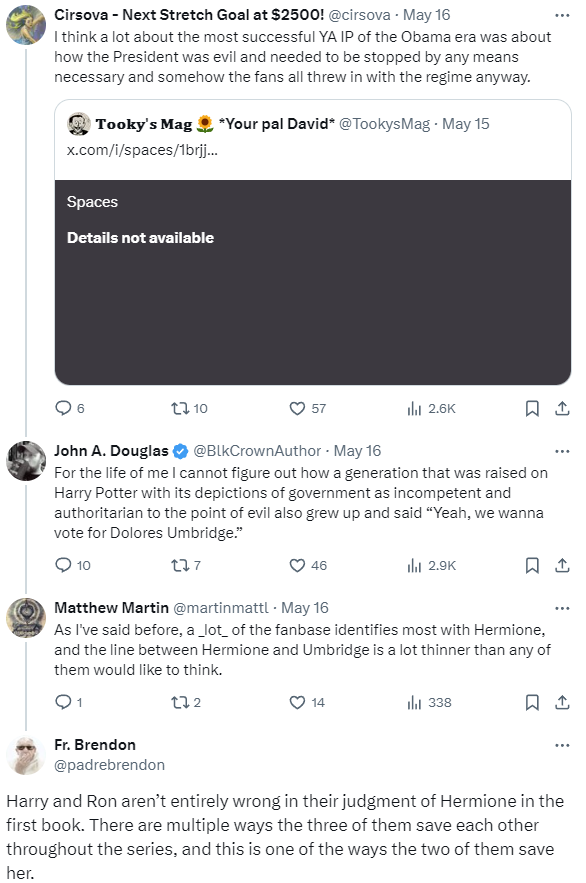
Among the [former] fans of Harry Potter who tended to have this perspective, you also find that many of them identified not with Harry, but with Hermione. However, the character with which they identify with isn't quite the character in the book, who starts off as rule-bound, humorless, and censorious, but who ends up becoming a very different person by the end of the series.

Hermione's friendship with Harry and Ron, and eventual marriage to Ron are what symbolically redeem her and prevent her from turning into Dolores Umbridge. Personality-wise and career-wise, the very online and very political fans of Harry Potter from a decade ago have more in common with the villains of the story than the hero. Something eventually had to give, and it did.
As the wall-of-text meme illustrates, the actual ending of Harry Potter, which is conventional for this kind of story, fails to resonate with this particular kind of un-fan because the vision of a world where people can get married, have kids, and live in peace isn't what they actually wanted, it was just possible to use meme-magic to obscure that inevitability for a while.
Happy endings do not impress us as true, but as desirable, and they are brought about by manipulation. The watcher of death and tragedy has nothing to do but sit and wait for the inevitable end; but something gets born at the end of comedy, and the watcher of birth is a member of a busy society.
...
Thus Shakespearean comedy illustrates, as clearly as any mythos we have, the archetypal function of literature in visualizing the world of desire, not as an escape from "reality," but as the genuine form of the world that human life tries to imitate.
--Northrop Frye, Third Essay
But the politically active and the very online do not actually define the reading public, and the themes of the Harry Potter books really do reflect what most people want: not an escape from reality, but a vision of what the world is truly meant to be.
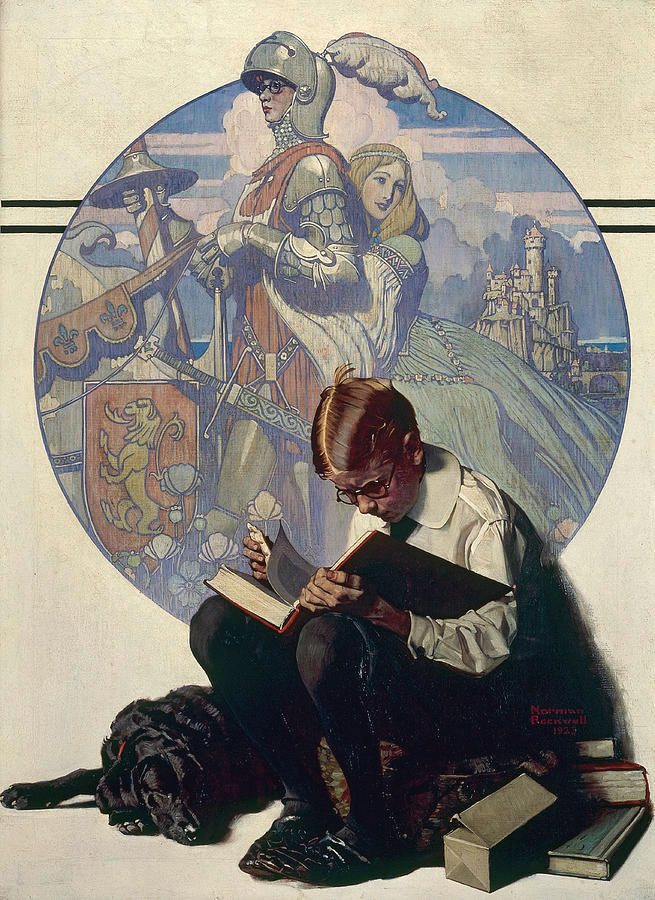
Romances point us toward eternal truths encoded in myths, at the end toward which we are fundamentally oriented. From her public comments on the books, we know that Rowling intended the Harry Potter stories to be a praeparatio evangelica, a spur to the curious to learn more about the Gospel. But if there is a place where I think Rowling's books didn't live up to their potential, it is here.
In a very contemporary style, Rowling chose to do this entirely by means of symbols and themes, excluding almost all explicit reference to religion of any sort. Symbolically, there are a great many Christian themes in the Harry Potter books. However, I suspect these symbols flew right over the heads of her audience, because you need to either already know the meaning of the Christian symbols or to be familiar enough with classical myth and legend to see the parallels. Contemporary audiences know neither.
In a case where I do have the reference, L. Jagi Lamplighter commented on the very similar way in which J. R. R. Tolkien chose to exclude explicit references to religion in the Lord of the Rings:
People who worry that reading fantasy will lead to interest in the occult are worried about this interpretation. And they may have some grounds for concern. I fear good Professor Tolkien would be rolling in his grave if he knew how many modern Wicca had found their way to their current beliefs by first stepping upon the path trod by Bilbo. (Spinning fast enough to run a generator…but I digress. This is not an essay on Tolkien Power.) I personally have a family member who pulled out his tarot cards and crystal ball every time a new Harry Potter book came out. But, then, my family member is mentally ill and may not be a good indicator of the reading population in general.
Precisely because the contemporary audience tends not to have read anything more than a few years old, any sort of classical or biblical allusion is lost on them. This is how you get people thinking Harry Potter thematically should have been a revolutionary, and Rowling just failed to follow through somehow because of her politics or her lack of commitment or some related moral failing.
But if Rowling truly intended for the Harry Potter stories to serve as a signpost towards the Gospel, I think she failed. Only people who are already Christian are struck by her Christian symbolism. I am unaware of any dramatic conversions where someone was inspired by the Harry Potter books to become a Christian. What has mostly occurred is people without any faith in particular were struck by the trappings of the story, but those people then substituted politics for religion in a way that ultimately was at cross-purposes with the themes of the story, and eventually they turned on Rowling and Harry Potter when the cognitive dissonance became too great to ignore.
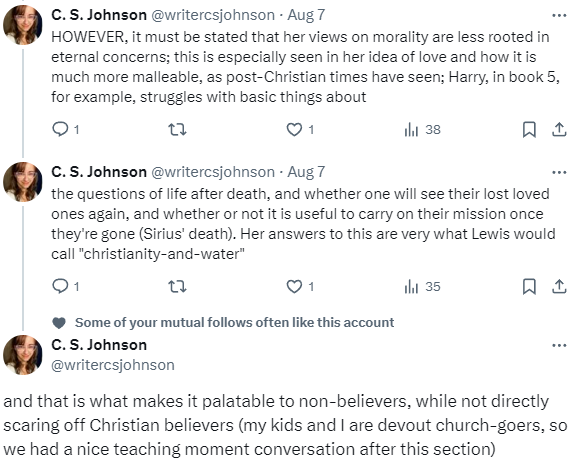
I do not think this phenomenon will define the place of the Harry Potter stories in literature, which deserve to be seen as very good, although perhaps not great fantasy adventure stories. Aside from literary merit, the Harry Potter books continue to sell very well indeed, as you can see from this screenshot of the Amazon sales rank of the illustrated version of Harry Potter and the Sorcerer's Stone.
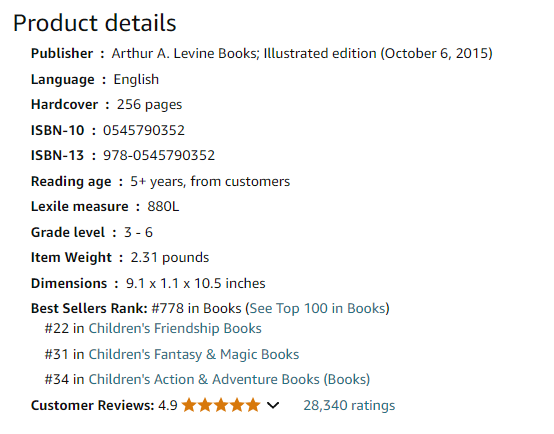
To get an overall sales rank that high, you need to sell more than a hundred books every day. That's not bad for a new edition of a book that's been in print for more than twenty-five years. This enduring popularity is a testament to the attraction of ordinary readers to the more obvious themes of the Harry Potter books, which center on the redeeming power of friendship, the value of a loving family, and the idea that justice is more than rule-following. I suspect that some reader interest also comes from things that the average reader couldn't articulate, but are nonetheless present.
The average audience at a symphony knows very little about sonata form, and misses practically all the subtleties detected by an analysis of the score; yet those subtleties are really there, and as the audience can hear everything that is being played, it gets them all as part of a linear experience; the awareness is less conscious, but not less real. The same is true of the response to the imagery of a highly concentrated poetic drama.
--Northrop Frye, Second Essay
A sense of destiny and heroism, of the possibility that great evil might one day be thrown down and the world made safe for ordinary people to live their lives in peace. A yearning for a better world to come. Together with the more obvious themes, these are the elements of the Harry Potter books that have made them popular, and because these themes are central to our sense of how the world ought to be. Thus, I expect the appeal of the Harry Potter stories to outlast any contemporary controversies.
With Both Hands Classics | My other book reviews | Reading Log
Mini-reviews


Comments ()